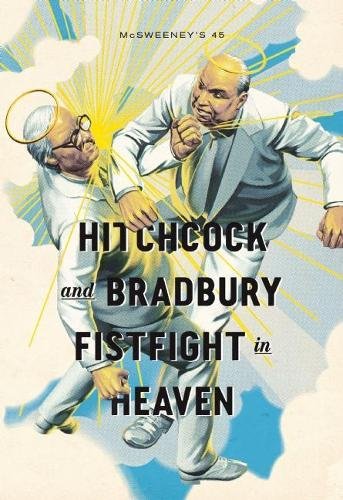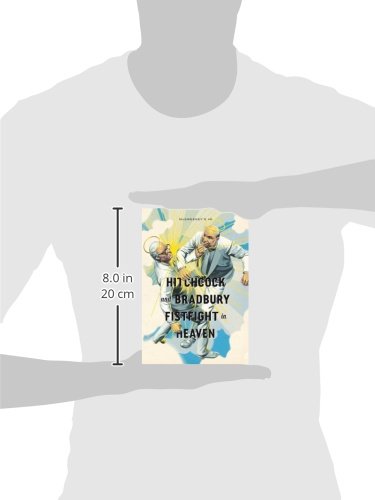Customer Services
Copyright © 2025 Desertcart Holdings Limited
Desert Online General Trading LLC
Dubai, United Arab Emirates



Full description not available
C**Y
So smart!
A brilliant idea for an anthology, beautifully curated.
A**N
Five Stars
Thanks!
K**E
How can you go wrong?
i am seriously thinking of subscribing so i can get more of these. Great reads. how can you go wrong?
E**R
What a treat!
As a child I always loved finding Alfred Hitchcock's short story anthologies lurking on the shelves of second-hand bookshops. The stories within titles such as "Get Me to the Wake on Time" and "Stories They Wouldn't Let Me Do on TV" were full of desperation, madness, perfidy, and bitterly ironic twists."McSweeney's 45" returns to this world with a selection from Alfred Hitchcock's anthology "Stories Not for the Nervous" mixed with fantasy stories from Ray Bradbury's "Timeless Stories for Today and Tomorrow". In addition to these tales from the thirties, forties, and fifties are four new stories in the same vein, introductions from Dave Eggers, Bradbury, and Hitchcock, and a selection of letters on the subject of genre fiction. The result is a thoroughly entertaining book and I enjoyed almost every story.Bradbury's selections include more 'literary' authors you might not expect to find in such anthologies, such as Franz Kafka, John Cheever, and John Steinbeck. These stories are excellent in their own right, but it's also rewarding to read them alongside the lesser-known authors within the genre framework. I particularly enjoyed 'Night Flight' by Josephine Johnson, a strange and moving story about soldiers who discover the power to fly, J. C. Furnas's playful 'The Laocoön Complex', and, on the final pages, 'Don't Look Behind You' which spooked me in spite of myself.Contents:The Sound Machine - Roald DahlNight Flight - Josephine W. JohnsonDune Roller- Julian MayThe Design - China MiévilleThe Laocoön Complex - J. C. FurnasThe Pedestrian - Ray BradburySorry, Wrong Number - Lucille Fletcher & Allan UllmanThe Dust - Brian EvensonThe Enormous Radio - John CheeverSaint Katy the Virgin - John SteinbeckFor All the Rude People - Jack RitchieSuicide Woods - Benjamin PercyIn the Penal Colony - Franz KafkaThe Pilgrim and the Angel - E. Lily YuHousing Problem - Henry KuttnerNone Before Me - Sidney CarrollDon't Look Behind You - Fredric Brown
M**N
Those Dusty Paperback Anthologies of Yore
McSweeney's 45 takes a bit of a detour from collecting the best of new writing to focus on the best of old writing. While there are four new stories here, the majority of the pieces are forgotten favorites (many dating from the 1940s and '50s) collected from science fiction anthologies curated by Bradbury and Hitchcock. In that McSweeney's is the foremost champion of the unknown and undiscovered, this issue serves as a grand excavation, going back to the influences of the authors who write for them today.The issue reads most like McSweeney's Issue 10, the Mammoth Treasury of Thrilling Tales--this is the issue that issue was tilting at. You get a LOT of stories here (448 pages' worth), and most of them are science fictional in some way, though never in the sense of floating through space. Most just feature an endearingly odd conceit, and what the characters at play do with that conceit.The book features writing giants like John Cheever, John Steinbeck, Franz Kafka, and Roald Dahl, as well as a variety of newcomers (Brian Evenson, E. Lily Yu, Benjamin Percy, and China Miéville), and many writers history has (mostly) forgotten.For example, the best piece comes from Julian May, who writes about a scientist in rural Michigan who discovers sentient alien globules. The globules become increasingly menacing, leading to a battle between the scientist and the mother globule. It's bracingly original, an interesting and unique concept executed well.Another great piece comes care of Lucille Fletcher and Allan Ullman. They write a radio play wherein an enfeebled heiress awaiting her husband's return searches the phone lines for him. Through a missed connection, she learns of a murder plot, and the story picks up from there. An example nonpareil of a forgotten genre, the radio thriller.The other truly phenomenal piece comes from Sidney Carroll, who writes about a wealthy collector who prides himself on collecting only the very best of whatever interests him. He becomes bewitched by dollhouses, buys the largest dollhouse in the world, and acts as its caretaker. As his other interests fall away, he becomes only interested in the dollhouse, considering himself not just caretaker but landlord, then king, then god of the dollhouse. Mad with his own power, he destroys the dollhouse. It's powerful and unique in its allegory that if there is a god, he could not resist destroying everything he makes, like a child with a sand castle. And where have you read anything like that before?There are many strong, engaging stories: China Miéville includes a tremendous story about a medical student who discovers a cadaver with illustrations drawn throughout its skeletal system; he sets off in search of others like it. In J.C. Furnas' story, a snake appears in a man's tub every time he pours a bath. He kills the snake, and kills it again, but it keeps returning. Brian Evenson writes about a drilling crew on a distant planet who are beset by an inextinguishable cloud of toxic dust. The dust drives the men, including the narrator, into fear and madness. In Ben Percy's story, a group of suicidals visit dead bodies to scare themselves away from their own deaths. Henry Kuttner's "Housing Problem" features two renters who discover that one of their roomers keeps a secret tiny family living in a dollhouse in his room. And Frederic Brown's metafictional horror story is a lot of fun, wherein the narrator threatens the reader ("YOU") directly with death.Cheever and Steinbeck both have pieces included largely because they're so different from what those authors typically write. In Cheever's story, a husband buys his wife a radio that allows her to hear the conversations of her neighbors. Steinbeck writes about a poorly behaved pig who becomes baptized and lives the rest of her life as a saint. It's a trifle, but an entertaining one--like discovering a dirty limerick written by DostoyevskyKafka's "In the Penal Colony" is included, wherein the last adherent of a brutal dictator gushingly describes the dictator's killing machine to a visitor, in order to win the visitor's influence to put the machine back to use. Roald Dahl writes about a kooky man who invents a machine that hears ultrasonic sounds, in this case the sounds of plants screaming. Jack Ritchie writes about a man who grows fed up with rude people and starts murdering them.There are only three weak pieces. E. Lily Yu's haughtily named "The Pilgrim and the Angel" is about Egyptian parents who miss their son who's moved to America. The father is blessed with a magic carpet ride that takes him from Cairo to Miami, where he's able to meet his son and talk to him, all in order to convince the son to call his mother. The father gets whisked back to Cairo and the son calls the mother. There's almost nothing to this one. Josephine W. Johnson writes a featherlight curio where a soldier revels in the night by flying (in his dreams?), drifting over America to visit his girl. Likely included for its old-timey, sweet aspect, it's really not much of anything.Surprisingly the weakest story of the bunch comes from Bradbury himself. In the (not-so-distant) future, a man out for a walk gets arrested for being out for a walk. This story exists as a perverse cautionary tale and a martyr's delight, the tawdriest habit of sci-fi, wherein authors create a world they despise just to pout at it--here, an uncommonly wise narrator is harangued for his unusual beliefs in the face of a cruel, awful world. Get over it, Ray.But it's worth noting that the three duds are also the three shortest stories, and that there is almost a direct correlation with length and quality here. It fits with the issue's aesthetic: these are pieces not from a simpler time, but certainly from a more patient one, when a reader had time to truly immerse himself in a story, or listen to a whole teleplay.The stories here are also all imminently readable. While they're sometimes adorable in their anachronisms, they're also free of much of the tedious overexertion of some modern writing. The stories are straight-forward, enjoyable, and intriguing, concepts made into plots, the reader first and foremost in their consideration. This is a great collection that deserves to be discovered another fifty years on, on a dusty digital bookshelf.
R**R
FANTASY
I DO NOT LIKE FANTASY. THAT IS STORIES ABOUT THINGS THAT ARE AGAINT THE LAWS OF PHYSCS. AND THE FIRST ONE IS. IN THAT STORY A MAN WORKS WITH HIGHER AND HIGHER FREQUENCIES OF VIABRATIONS AND THE WHOLE STORY IS BASED ON THESE HIGHER VIABRATIONS CONTINUE TO BE SOUND WHIC IS ABSURD, THEY BEOME INFRAD RED HEAT AND SO ON UP THE ELECTOR MAGNETIC SCALE.
E**R
What a treat!
As a child I always loved finding Alfred Hitchcock's short story anthologies lurking on the shelves of second-hand bookshops. The stories within titles such as "Get Me to the Wake on Time" and "Stories They Wouldn't Let Me Do on TV" were full of desperation, madness, perfidy, and bitterly ironic twists."McSweeney's 45" returns to this world with a selection from Alfred Hitchcock's anthology "Stories Not for the Nervous" mixed with fantasy stories from Ray Bradbury's "Timeless Stories for Today and Tomorrow". In addition to these tales from the thirties, forties, and fifties are four new stories in the same vein, introductions from Dave Eggers, Bradbury, and Hitchcock, and a selection of letters on the subject of genre fiction. The result is a thoroughly entertaining book and I enjoyed almost every story.Bradbury's selections include more 'literary' authors you might not expect to find in such anthologies, such as Franz Kafka, John Cheever, and John Steinbeck. These stories are excellent in their own right, but it's also rewarding to read them alongside the lesser-known authors within the genre framework. I particularly enjoyed 'Night Flight' by Josephine Johnson, a strange and moving story about soldiers who discover the power to fly, J. C. Furnas's playful 'The Laocoön Complex', and, on the final pages, 'Don't Look Behind You' which spooked me in spite of myself.Contents:The Sound Machine - Roald DahlNight Flight - Josephine W. JohnsonDune Roller- Julian MayThe Design - China MiévilleThe Laocoön Complex - J. C. FurnasThe Pedestrian - Ray BradburySorry, Wrong Number - Lucille Fletcher & Allan UllmanThe Dust - Brian EvensonThe Enormous Radio - John CheeverSaint Katy the Virgin - John SteinbeckFor All the Rude People - Jack RitchieSuicide Woods - Benjamin PercyIn the Penal Colony - Franz KafkaThe Pilgrim and the Angel - E. Lily YuHousing Problem - Henry KuttnerNone Before Me - Sidney CarrollDon't Look Behind You - Fredric Brown
I**N
Excellent
Excellent
M**I
ok
The item was good and came on time, fast shipping + + + + + + + + + +
Trustpilot
1 month ago
1 week ago